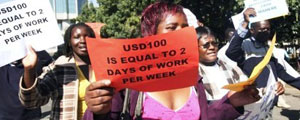
THE Zimbabwe Teachers’ Association (Zimta) has said the ongoing labour law harmonisation that teachers have been pushing for will give clarity on the course of action to take in the event that dialogue between government and labour failed.
Zimta chief executive Sifiso Ndlovu yesterday said following the recent Zimta workshop on the Global Day of Action on the Right to Strike, it was resolved that government should ensure that the harmonisation process be done speedily to enable them to fully exercise their right to strike and to participate in collective bargaining processes.
“Since these issues have been incorporated into the new Constitution, they must find expression in an Act of Parliament,” Ndlovu said.
“Once we have an Act, it then gives clarification on what must be done before we go for industrial action, informing us what is the conflict resolution alternative when dialogue has failed.”
He said although teachers celebrated their newly-acquired right to strike, as provided for in Section 65 (3) of the new Constitution, they also wanted to exercise their right to enter into collective bargaining processes with the government because the current National Joint Negotiating Council platform had proved to be less effective over the years.
Ndlovu said it was important to promote “industrial democracy” which regarded job action as an alternative in resolving a deadlock in negotiations, adding that this was the missing link in the old governance charter.
He, however, bemoaned plans by government to tighten labour laws so that legal disputes with employees – which cost companies huge amounts of money – could be quickly and easily disposed of largely in favour of companies.
“This is a way of weakening labour unions,” Ndlovu said. “They give the employer an edge over the employee union and clearly this is something we don’t want.”
- Chamisa under fire over US$120K donation
- Mavhunga puts DeMbare into Chibuku quarterfinals
- Pension funds bet on Cabora Bassa oilfields
- Councils defy govt fire tender directive
Keep Reading
During the workshop, Ministry of Public Service, Labour and Social Welfare industrial relations labour officer Fadzai Matowe updated delegates on the status of labour law reforms, indicating that the Bill of the harmonised labour laws was at the stage of the Attorney-General’s Office.











